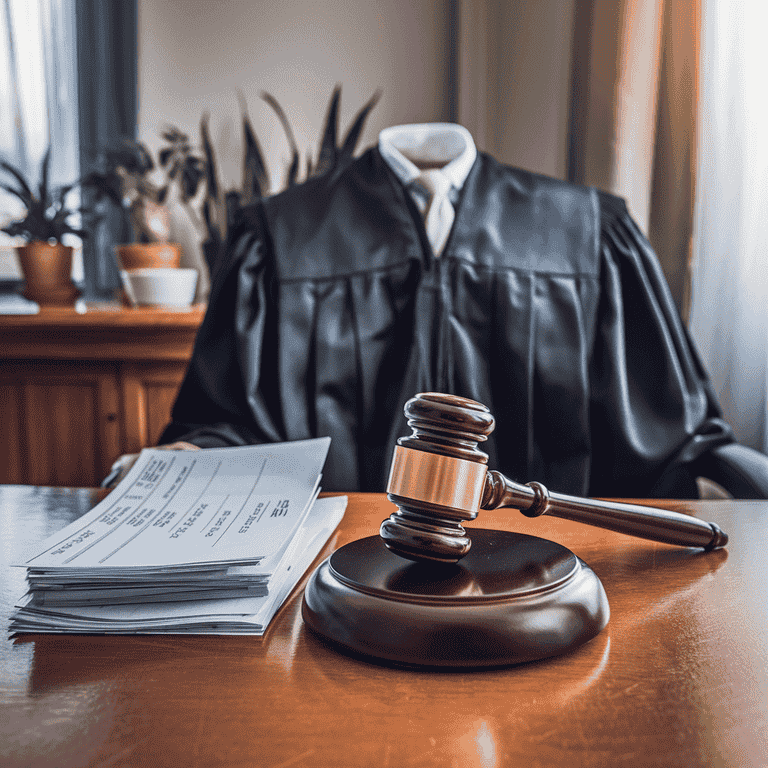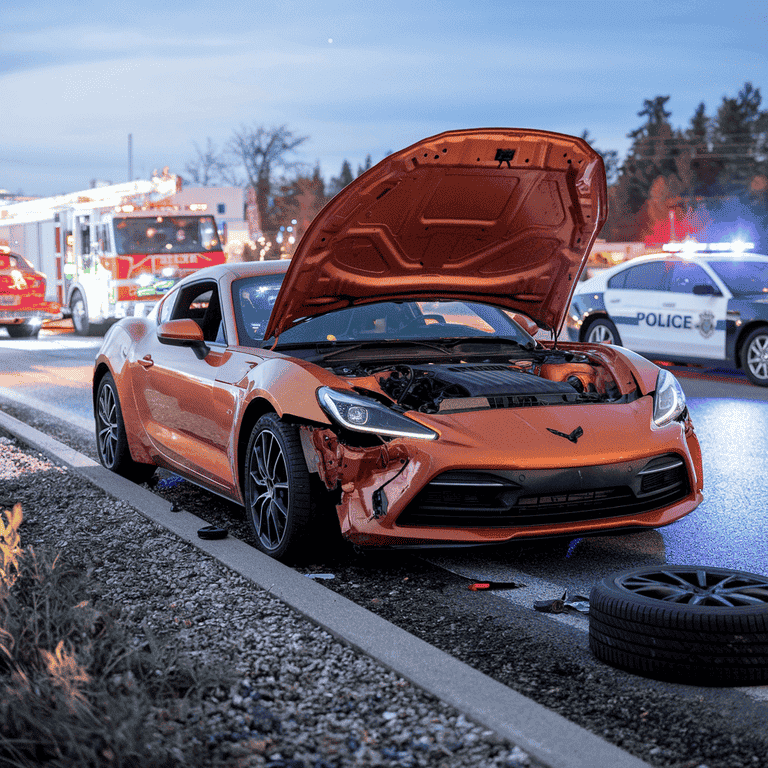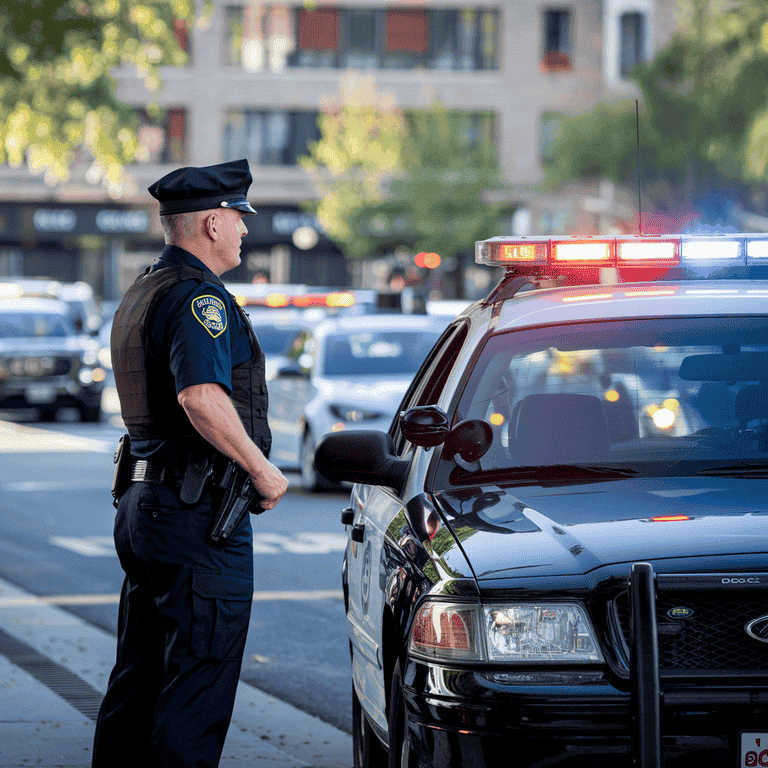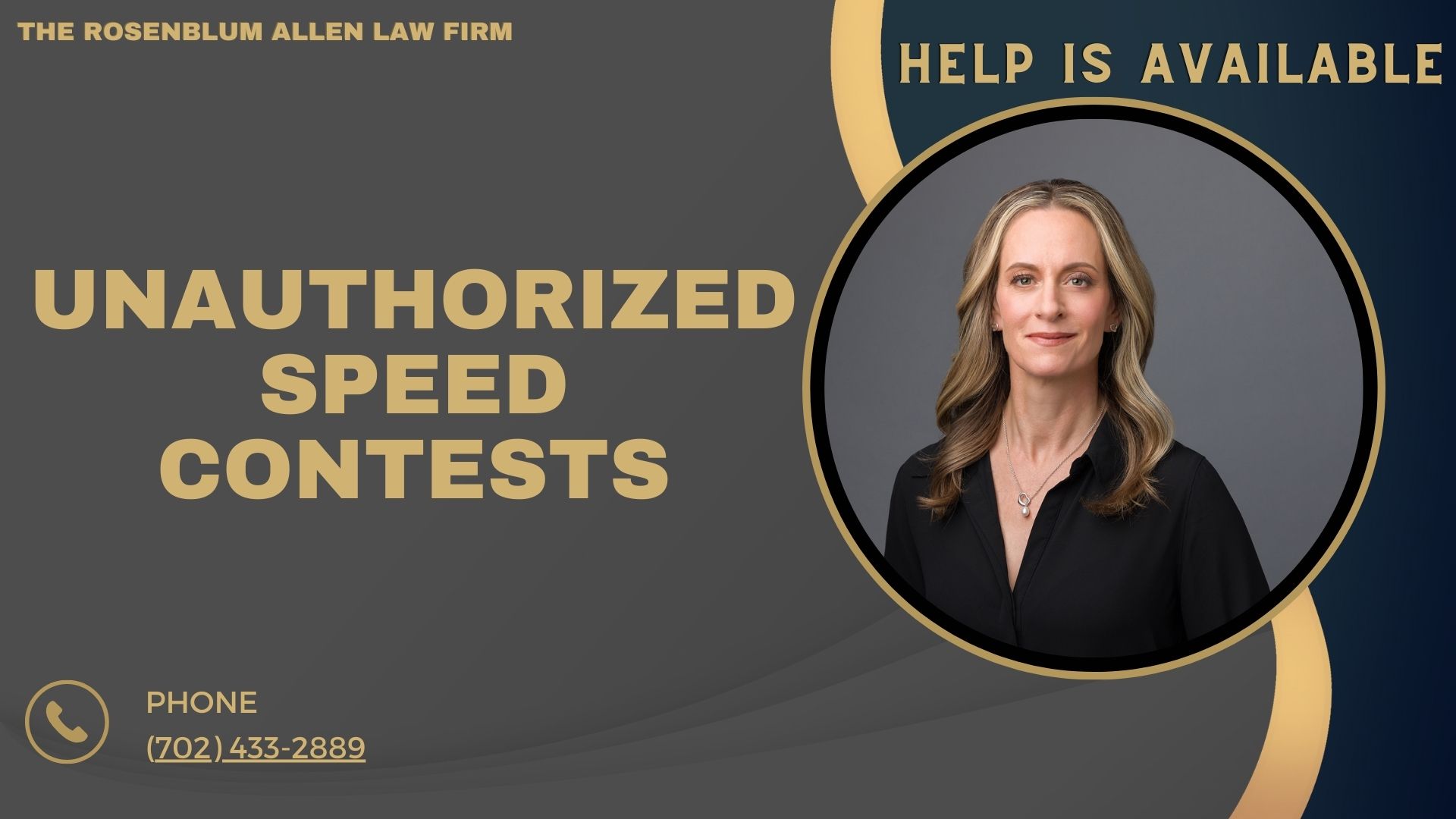Buckle up, folks! We’re about to take a deep dive into the world of unauthorized speed contests. It’s a topic that might get your adrenaline pumping, but trust me, the consequences can be much more severe than a simple speeding ticket.
 Definition of Unauthorized Speed Contests
Definition of Unauthorized Speed Contests
Let’s start by explaining what we mean by unauthorized speed contests. It’s not just about putting the pedal to the metal on a lonely stretch of road.
Legal terminology
When it comes to the law, precision is critical. Here are the terms you need to know:
Speed contest
A speed contest is any event in which two or more vehicles compete to outpace each other. It’s not just about who can go fastest but also who can reach a certain point first.
Street racing
This is probably what most people think of when they hear “speed contest.” It’s exactly what it sounds like racing on public streets, often impromptu and always illegal.
Drag racing
A specific type of race where vehicles compete in a straight line over a short distance. It’s often associated with muscle cars and roaring engines.

Key elements
What turns a simple drive into an unauthorized speed contest? Here are the crucial factors:
Multiple vehicles involved
It takes two to tango and at least two vehicles to have a contest. Solo speeding is dangerous, but it’s not a contest.
Racing on public roads
The “unauthorized” part is critical here. These contests occur on roads meant for regular traffic, not on sanctioned race tracks.
Timing or competition aspect
There needs to be an element of competition. This competitive edge defines a contest, whether it’s an official timer or just a race to the next stoplight.
Federal laws
Surprisingly, there aren’t many federal laws specifically targeting speed contests. Most of the legal action happens at the state and local level. However, federal agencies like the National Highway Traffic Safety Administration (NHTSA) work to combat illegal racing through education and support for local law enforcement.

Types of Unauthorized Speed Contests
Alright, speed demons, let’s break down the different flavors of illegal racing. Trust me, they’re all spicy, but in various ways.
Traditional street races
Picture this: two cars, side by side, engines revving. A flag drops, and they’re off! This is the classic street race, often glamorized in movies. But in real life, it’s far from glamorous. These races typically involve:
- Pre-arranged meeting spots
- Straight stretches of road
- High speeds and high risks
Exhibition of speed
Sometimes, it’s about something other than getting from A to B the fastest. It’s about showing off. These exhibitions can include:
Burnouts
You are spinning your wheels to create smoke and noise. It’s like a peacock’s display but with more rubber and fewer feathers.
Doughnuts
It was driving in tight circles to leave circular skid marks. It’s fun at the fair but not so much on public roads.
Acceleration contests
Who can go from 0 to 60 the fastest? These short bursts of speed are just as illegal as longer races.
Organized events
In the age of social media, illegal racing has gone high-tech.
Social media coordination
Racers use apps and social platforms to organize meets. It’s like flash mobs but with more horsepower and less dancing.
Spectator involvement
These events often draw crowds. Remember, watching can be just as illegal as participating in some places.

Legal Consequences
Now for the part that’ll make your wallet sweat and your license tremble.
Criminal charges
Getting caught in a speed contest isn’t just a slap on the wrist. It’s serious business.
Misdemeanor offenses
First-time offenders often face misdemeanor charges. But don’t let the term fool you – it’s still no laughing matter.
Felony charges for aggravated cases
Repeat offenders or cases involving injury can raise the charge to a felony, which is when things get really serious.
Fines
I hope you’ve been saving up. These fines can put a severe dent in your bank account.
Jail time
From a few days to a few years. Is that adrenaline rush worth it?
License suspension
No license means no driving. Period. Good luck explaining that to your boss.
Vehicle impoundment
Your car gets a timeout. And you foot the bill for its stay at the impound lot.
Community service
Trade in your racing gloves for work gloves. You might be picking up trash on the side of the road you once raced on.
Additional charges
As if the racing charges weren’t enough, you might face:
Reckless driving
This often goes hand-in-hand with racing charges.
DUI if applicable
Are you mixing speed and alcohol? That’s a recipe for disaster and doubled penalties.
Remember, folks, the thrill of the race is temporary, but a criminal record is forever. Is it worth risking your future for a few minutes of excitement? Think about it.

Risks and Dangers
Let’s talk about the elephant in the room – or the speeding car on the street. Unauthorized speed contests aren’t just illegal; they’re downright dangerous.
Public safety concerns
You’re not just risking your neck when you turn public roads into racetracks.
Injuries to participants
You might feel invincible behind the wheel, but physics doesn’t care about your confidence. Racing can lead to:
- Severe injuries
- Lifelong disabilities
- Fatalities
And trust me, no trophy is worth that.
Risks to bystanders and property
Remember, you’re not the only one on the road. Your split-second decision can change someone else’s life forever. Think about:
- Pedestrians
- Other drivers
- Nearby residents
One wrong move and you could be responsible for someone else’s tragedy.
Traffic disruptions
Have you ever been stuck in traffic and wondered what caused it? Sometimes, it’s wannabe racers. Speed contests can lead to:
- Road closures
- Traffic jams
- Delayed emergency responses
Imagine if an ambulance couldn’t get through because of an impromptu race. Not cool, right?
Property damage
Cars aren’t the only things that can get wrecked. Speed contests often result in:
- Damaged road surfaces
- Destroyed street signs and lights
- Wrecked personal property
And who often foots the bill? Taxpayers. That’s right, your need for speed could be costing your community.

Enforcement Strategies
Let’s look at how the law catches up with speed demons.
Police task forces
Many cities have special units dedicated to cracking down on street racing. These aren’t your average traffic cops. They’re:
- Specially trained
- Equipped with high-performance vehicles
- Often working undercover
If you think you can outrun them, think again.
Technology use
Welcome to the 21st century, where Big Brother is always watching.
Social media monitoring
Remember those Facebook events for “car meets”? Yeah, the police can see those too. They’re monitoring:
- Social media platforms
- Racing forums
- Messaging apps
Your online bravado could be your downfall.
Traffic cameras
Those cameras aren’t just for red-light runners anymore. They’re being used to:
- Identify racing hotspots
- Catch racers in the act
- Provide evidence for prosecutions
Smile, you’re on camera!
Community reporting
Ever heard the phrase “If you see something, say something”? It applies here, too. Communities are fighting back with:
- Anonymous tip lines
- Neighborhood watch programs
- Cooperation with law enforcement
Your neighbors might be the ones turning you in.

Prevention and Alternatives
Now, I know what you’re thinking. “But I love the thrill of speed!” Don’t worry; there are legal ways to satisfy your need for speed.
Legal racing venues
Many cities have sanctioned racing events. These offer:
- Safe, controlled environments
- Professional supervision
- The chance to race without risking jail time
It’s all the fun without the felony charges!
Driver education programs
Want to improve your skills? Try:
- Advanced driving courses
- Defensive driving classes
- Racing schools
These can make you a better driver on and off the track.
Community outreach initiatives
Many communities are taking a proactive approach:
- Youth mentoring programs
- Car enthusiast meet-ups
- Educational events about the dangers of street racing
Remember, you can be passionate about cars without breaking the law.
So there you have it, folks. Unauthorized speed contests might seem exciting, but the risks outweigh the rewards. Stay safe, stay legal, and if you need to race, do it where it’s allowed. Your future self (and your wallet) will thank you!

Breaking It All Down
So, the next time you feel the urge to put the pedal to the metal where, you shouldn’t take a deep breath. Think about the consequences. Consider the alternatives. Because at the end of the day, the most important race isn’t about who’s fastest – it’s about who makes it home safely.
Stay safe out there, and keep the racing where it belongs – on the track, not the streets. Your future self will thank you for making the right choice today—after all, life’s too precious to gamble away in an illegal race. Let’s do our part to keep our roads safe and our communities thriving.

Frequently Asked Questions
What’s the difference between street racing and exhibition of speed?
Street racing typically involves competition between two or more vehicles. At the same time, an exhibition of speed can be a solo act showing off a vehicle’s acceleration or power, such as peeling out or doing burnouts.
Can I be charged for street racing if I wasn’t driving?
Yes, you can be charged in many jurisdictions for aiding and abetting a street race even if you weren’t driving. This could include being a passenger, helping to organize the race, or acting as a lookout.
Are there any legal alternatives to street racing?
Many racetracks offer “track days” or “street legal” racing events where you can safely test your vehicle’s performance in a controlled environment. Some police departments also organize supervised racing events to discourage illegal street racing.
How do police catch street racers?
Police use various methods, including high-performance vehicles, helicopters, traffic cameras, and social media monitoring. They may also rely on community tips and set up sting operations in known racing hotspots.
Can my car insurance rates increase if I’m caught street racing?
Absolutely. Insurance companies view street racing as extremely high-risk behavior. If caught, you may face significantly higher premiums or even policy cancellation.
What happens if I’m caught street racing with a suspended license?
Racing with a suspended license can result in more severe penalties, including longer license suspensions, higher fines, and possible jail time. It’s considered a severe offense in most jurisdictions.
Can street racing lead to other criminal charges?
Yes, depending on the circumstances, street racing could lead to additional charges such as reckless endangerment, assault with a deadly weapon (if someone is injured), or even felony murder if a death occurs.
Are there any defenses against street racing charges?
Possible defenses include lack of intent to race, mistaken identity, or challenging the evidence. However, consulting with a qualified attorney is crucial to discuss specific defenses for your case.
How does street racing affect my driving record?
A street racing conviction typically results in many points on your driving record, which can lead to license suspension or revocation, especially if you have prior offenses.
Can I lose my job due to a street racing conviction?
It’s possible, especially if your job involves driving or requires a clean criminal record. Some employers may view a street racing conviction as evidence of poor judgment or risk-taking behavior.

Glossary
Acceleration contest: A type of speed competition where drivers compete to see who can increase speed the fastest over a short distance.
Burnout: The practice of keeping a vehicle stationary while spinning its wheels, causing the tires to heat up and smoke.
Drag racing: A form of racing where two vehicles compete side by side on a straight, short-distance track.
DUI: Acronym for “Driving Under the Influence,” referring to operating a vehicle while impaired by alcohol or drugs.
Exhibition of speed: Any display of rapid acceleration, speed, or power of a vehicle, often performed to impress onlookers.
Felony: A serious crime typically punishable by imprisonment for more than one year or death.
Impoundment: The legal seizure and holding of a vehicle by law enforcement, often as a penalty for traffic violations.
Misdemeanor: A criminal offense less serious than a felony, typically punishable by a fine or short jail term.
NHTSA: Acronym for the National Highway Traffic Safety Administration, a federal agency responsible for highway safety.
Ordinance: A law or regulation made by a city or town government.
Reckless driving: Operating a vehicle with willful or wanton disregard for the safety of persons or property.
Speed contest: Any event in which one or more persons compete to outdistance or arrive before other competitors using motor vehicles.
Street racing: The act of racing motor vehicles on public roads, typically illegally.
Spectator: A person who watches an event, in this context often referring to individuals who observe illegal street races.
Task force: A temporary unit or formation established to work on a single defined task or activity, often used in law enforcement to address specific issues like street racing.
Vehicle Code: A collection of laws and regulations governing the operation of motor vehicles and the use of public roads.

Additional Resources for You
Our lead attorney, Molly Rosenblum Allen, Esq., has created several valuable resources to assist you with various legal matters:
- Criminal Defense Attorneys: Comprehensive legal representation for various criminal charges in Las Vegas.
- Las Vegas DUI Lawyer: Specialized defense for DUI cases, offering strategies to minimize penalties and protect your rights.
- Domestic Violence Lawyer Las Vegas: Effective legal support for those facing domestic violence charges, focusing on fair treatment and resolution.
- Drug Possession Lawyer: Dedicated defense for drug-related charges, aiming to reduce or dismiss charges when possible.
- Sex Crimes Attorney: Sensitive and thorough representation for those accused of sex-related offenses.
- CPS Defense Attorney: Specialized assistance in cases involving Child Protective Services, protecting parental rights and family integrity.
- Misdemeanor Lawyer: Effective guidance for those facing misdemeanor charges.
- Las Vegas Warrant Defense Attorney: Assistance with outstanding warrants and related legal issues.
- Las Vegas Probation Violation Attorney: Support for those dealing with probation violation matters.
- Theft Crime Defense Lawyer: Specialized defense for various theft-related charges.
- Kidnapping Lawyers: Effective legal representation for kidnapping cases.
- Juvenile Defense Lawyers: Dedicated support for young individuals facing legal challenges.
- Firearms Lawyer Las Vegas: Specialized assistance with firearm-related legal issues.

Offsite Resources for You
We understand that navigating legal situations can be complex and often overwhelming. To assist you further, we’ve compiled a list of external resources that provide additional information and support. We hope you find these links helpful.
American Bar Association: The ABA provides resources for the public to help understand your rights and the legal process.
Legal Services Corporation: This nonprofit corporation provides financial support for civil legal aid to low-income Americans.
National Association of Criminal Defense Lawyers: NACDL promotes excellence and integrity in the criminal defense profession and to ensure due process and fairness in the criminal justice system.
The National Legal Aid & Defender Association: NLADA is America’s oldest and largest nonprofit association devoted to excellence in the delivery of legal services to those who cannot afford counsel.
Nevada State Bar: Provides a directory of lawyers licensed to practice in the state and information about law in Nevada.
LawHelp.org: Provides referrals to local legal aid and public interest law offices, basic information about legal rights, self-help information, court information, links to social service agencies, and more in your state.
Justia: Free case law, statutes, regulations, legal articles and legal blog and twitterer databases, as well as additional community resources.
Remember, while these resources can provide valuable information, they are not a replacement for legal advice. Please do not hesitate to reach out to a legal professional for advice tailored to your specific circumstances.

A Special Message from Our Lead Attorney

Dear Reader,
If you’re ready to take the next step in addressing your legal situation, I invite you to reach out to our team. We’re here to listen, provide guidance, and develop a strategic approach tailored to your specific circumstances. You can contact us at (702) 433-2889 to get the ball rolling on your case. Remember, when it comes to legal matters, time is often of the essence. Don’t hesitate to call and start the process of protecting your rights and securing your future. We look forward to the opportunity to assist you.
Sincerely,
Molly Rosenblum Allen, Esq.



